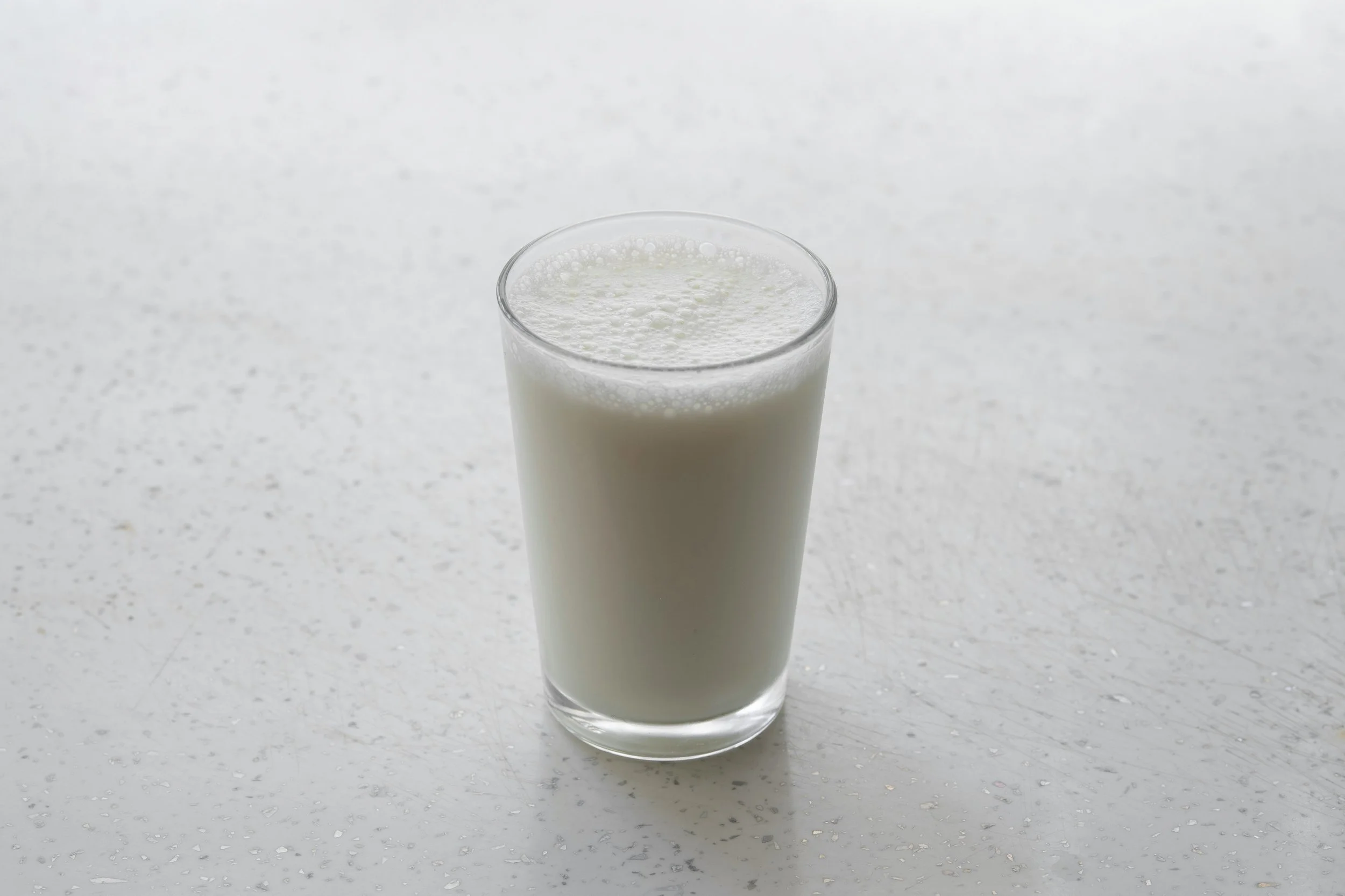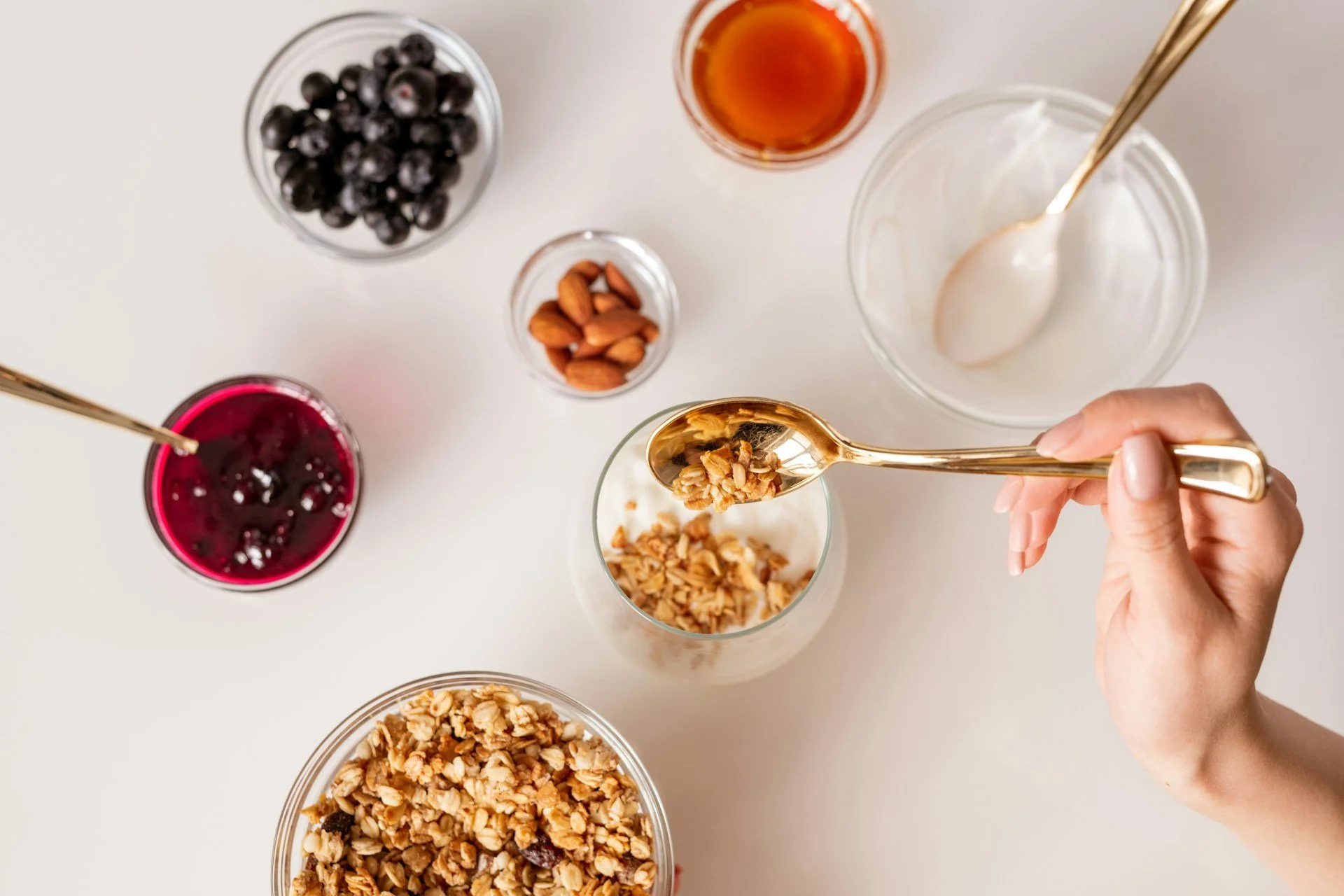Is it really okay to eat before bed? Nutritionist tips for late-night snacking
As a nutritionist, I get this question a lot: Is it okay to eat before bed? And the answer is...well, it depends! Like many things in nutrition, there isn't a one-size-fits-all answer. Let’s break it down and consider a few key points.
Late-Night Hunger: Are you eating out of hunger or habit?
First, why are you eating before bed? Are you genuinely hungry, or is it boredom that’s got you reaching for snacks? If you’re feeling real hunger, that’s your body’s way of telling you it needs fuel, and it's okay to honor that. However, if it’s just mindless snacking because you’re scrolling through Netflix, and you’ve got fitness goals: like maintaining a calorie deficit, then this habit can hinder progress if weight loss is your focus.
How eating before bed affects your sleep and Gut health
Another thing to consider is how eating before bed impacts your sleep. Studies have shown that eating right before bed can disrupt your sleep patterns. Late-night meals might leave you feeling too full to relax or lead to indigestion, both of which can interfere with your rest. Your gut also needs some rest, which is why I often recommend a 12-hour fast between dinner and breakfast. For example, if you finish dinner by 8 p.m., aim to have breakfast no earlier than 8 a.m. This break gives your digestive system time to recover and reset, which is important for gut health ¹.
How eating late might affect your circadian rhythm
Then, there’s the question of how eating late might affect your circadian rhythm. It seems that disruptions in your body’s natural circadian rhythm (caused by irregular eating and sleeping habits) can increase the likelihood of developing obesity and cardiometabolic conditions ².
Late-night eating, in particular, may disrupt your internal clock, which can negatively affect sleep and metabolism. Research indicates that sticking to daytime eating supports better weight management and overall health outcomes ³.
When it’s okay to eat before bed: Listening to your body and honoring hunger
That said, sometimes, eating before bed is absolutely fine. If you’re truly hungry, that’s a signal that your body needs more fuel, and it’s okay to respond to that. Whether it’s a snack or something more substantial, honoring hunger is important. There’s also a place for balance: sometimes you just want to snack while enjoying a cozy Netflix binge, and that’s totally okay. Enjoying life and indulging once in a while is part of a healthy relationship with food.
Eating before bed can promote muscle recovery: The case of casein protein
If your goal is muscle building or recovery, eating before bed can actually be beneficial. In this case, eating before bed isn’t just okay: it’s a smart choice for your fitness goals. For example, foods like casein are rich in protein and slow-digesting, providing a steady release of amino acids throughout the night to support muscle repair and growth ⁴. Studies show that consuming 20-40 grams of casein before bed can increase muscle protein synthesis and improve recovery ⁵.
Casein-rich foods include casein protein powder (as a shake), cottage cheese, greek yogurt, milk, cheese and even icecream (yum!).
Late eating and weight management
When it comes to weight management, the timing of your meals is less important than the overall balance of calories consumed throughout the day. As long as you're in a calorie deficit, meaning you're consuming fewer calories than your body needs, you’ll still lose weight, regardless of whether you eat at night. The idea that eating before bed automatically causes weight gain is a myth. It’s more about what and how much you’re eating than when. So, if your total daily intake is in check, a pre-bed snack won’t derail your progress.
P.S. : However, when it comes to managing appetite, having a larger breakfast may help with sticking to a weight loss plan by better controlling hunger throughout the day ⁶. So, if you often find yourself feeling super hungry by dinner, a hearty breakfast might be just what you need.
Nutritionist-approved tips for smart late-night snacking
Prioritize balanced meals during the day
Often, when people feel excessively hungry late in the evening, it's because they didn’t eat enough during the day or their meals lacked key nutrients. Skipping meals, eating too little, or choosing fast foods and highly processed foods can leave you feeling deprived. One of the most effective ways to avoid late-night snacking is to make sure you're eating balanced, satisfying, and regular meals throughout the day. When your meals are rich in protein, healthy fats, fiber, and complex carbohydrates, they keep you fuller for longer and help stabilize blood sugar levels, which can reduce nighttime cravings.
‘‘Sleep-friendly’’ foods
Some foods, like those high in tryptophan (turkey, almonds), magnesium (bananas, dark leafy greens), and vitamin B6 (bananas, avocados), can promote better sleep. Including these in your late-night snack can help support relaxation and a good night’s rest⁷ ⁸.
Keep it light
Opt for easily digestible foods, so you’re not going to bed feeling heavy or uncomfortable. Opt for snacks that combine protein and healthy fats with some fiber. A small bowl of Greek yogurt with berries, an apple with a nut butter can satisfy hunger.
Stay hydrated
Sometimes late-night cravings can be mistaken for thirst. Drink a glass of water and wait a few minutes to see if the craving subsides. However, avoid drinking large amounts of fluids close to bedtime to prevent sleep interruptions from bathroom trips.
5. Address emotional eating
I believe this is a crucial point that often gets underestimated: many people struggle with emotional eating. Emotional eating can lead to consuming food out of boredom, stress, or even sadness rather than true hunger. To avoid this, it’s important to recognize your emotional triggers and find other ways to cope, like engaging in activities you enjoy, journaling, or practicing mindfulness.
6. Creating a supportive food environment
A simple but effective way to manage late-night snacking is to clear your kitchen of tempting, less nutritious snacks and instead place healthier options like fruits, nuts, or yogurt in easily accessible areas. I’m not suggesting you give up on your favorite treats entirely: it's important to enjoy them! But if you notice it's becoming a regular habit, it might be better to buy your treats intentionally and enjoy them mindfully once in a while, rather than keeping them constantly on hand.
To conclude, my advice as a nutritionist is to avoid eating too close to bedtime and keep it as an occasional thing rather than a daily habit. This will support better digestion, sleep quality, and overall health.
Ready to change your nutrition ? Book a free discovery call
Whether you're navigating late-night cravings or looking to improve your daily eating habits, I’m here to help! Book a FREE 15-Minute call today to discuss your goals and how we can create a plan that works for you.
I look forward to helping you thrive!
Mia
Curious to learn more? These articles cover related topics to keep you informed:
References (to geek out further):
1.Duboc, Henri, et al. “Disruption of Circadian Rhythms and Gut Motility.” Journal of Clinical Gastroenterology, vol. 54, no. 5, 2020, pp. 405–414, https://doi.org/10.1097/mcg.0000000000001333.
2.Boege, Hedda L, et al. “Circadian Rhythms and Meal Timing: Impact on Energy Balance and Body Weight.” Current Opinion in Biotechnology, vol. 70, Aug. 2021, pp. 1–6, https://doi.org/10.1016/j.copbio.2020.08.009.
3.Meléndez-Fernández, O. Hecmarie, et al. “Circadian Rhythms Disrupted by Light at Night and Mistimed Food Intake Alter Hormonal Rhythms and Metabolism.” International Journal of Molecular Sciences, vol. 24, no. 4, 1 Jan. 2023, p. 3392, www.mdpi.com/1422-0067/24/4/3392, https://doi.org/10.3390/ijms24043392.
4.Snijders, Tim, et al. “The Impact of Pre-Sleep Protein Ingestion on the Skeletal Muscle Adaptive Response to Exercise in Humans: An Update.” Frontiers in Nutrition, vol. 6, no. 17, 6 Mar. 2019, www.frontiersin.org/articles/10.3389/fnut.2019.00017/full, https://doi.org/10.3389/fnut.2019.00017.
5.Reis, Caio E.G., et al. “Effects of Pre-Sleep Protein Consumption on Muscle-Related Outcomes — a Systematic Review.” Journal of Science and Medicine in Sport, vol. 24, no. 2, Aug. 2020, https://doi.org/10.1016/j.jsams.2020.07.016.
6.Ruddick-Collins, Leonie C., et al. “Timing of Daily Calorie Loading Affects Appetite and Hunger Responses without Changes in Energy Metabolism in Healthy Subjects with Obesity.” Cell Metabolism, vol. 34, no. 10, 9 Sept. 2022, www.sciencedirect.com/science/article/pii/S1550413122003448?via%3Dihub, https://doi.org/10.1016/j.cmet.2022.08.001.
7.Zuraikat, Faris M., et al. “Sleep and Diet: Mounting Evidence of a Cyclical Relationship.” Annual Review of Nutrition, vol. 41, no. 1, 4 Aug. 2021, https://doi.org/10.1146/annurev-nutr-120420-021719.
8.Binks, Hannah, et al. “Effects of Diet on Sleep: A Narrative Review.” Nutrients, vol. 12, no. 4, 27 Mar. 2020, p. 936, www.ncbi.nlm.nih.gov/pmc/articles/PMC7230229/, https://doi.org/10.3390/nu12040936.





























